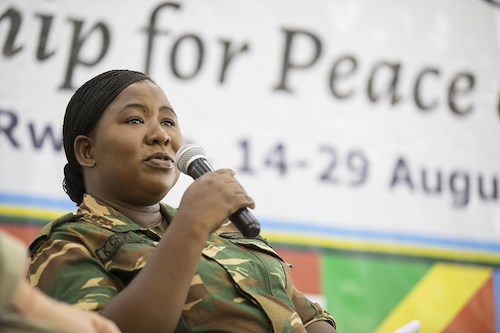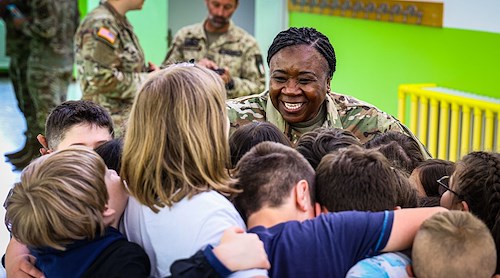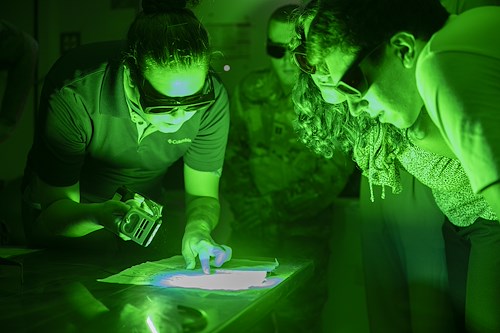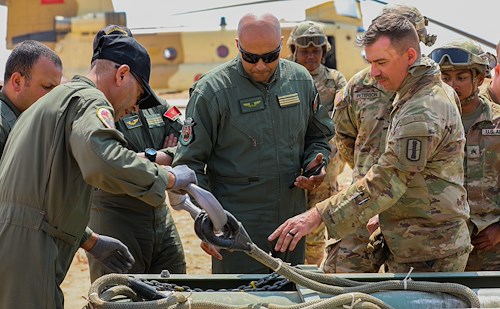Gallery contains 1 image
×
Photo 1 of 1
Recruiting and retaining female peacekeepers is an operational imperative
Maj. Ketty Chikwekwe, officer with the Zambian Army, speaks at the “Women in Peacekeeping” panel during the Shared Accord exercise 2018, Gako, Rwanda, Aug. 22, 2018. The panel was composed of female servicemembers, who have served on U.N. Peacekeeping missions, as part of a discussion about the importance of women as peacekeepers. (U.S. Army photo by Sgt. Micah Merrill)
Photo by: Cpt. Olivia Cobiskey
GAKO, Rwanda – It was a simple message.
The major theme of Wednesday’s panel discussion, “Women in Peacekeeping Operations,” at the Rwanda Military Academy centered on the notion that women in combat-related roles can make it easier for peacekeepers to reach women and children in conflict areas.
“Women are looking at the specific needs of women,” said Maj. Ketty Chikwekwe, an operations officer in the Zambian Defence Force. “For instance, a woman who has been subjected to rape or gender-based violence will be more comfortable sharing their story with their fellow women, than a male. So, I think if we are to get the real jist of the problem in these conflicted communities, we need to involve the female peacekeepers.”
Since U.N. Security Council Resolution 1325 was passed 18 years ago, women have proven they are powerful players in peacekeeping operations in which they have taken part, said Bintou Keita, assistant secretary-general for U.N. Peacekeeping Operations.
“The presence of women in our peacekeeping missions empowers women in the host communities, allows our operations to address specific needs of female ex-combatants during the process of demobilizing and reintegration into civilian life, contributes to making the peacekeeping force approachable to women and young people in the community,” Keita said. “It also helps ensure that the mission is aware of all protection requirements of the local population; interviews survivors of gender-based violence and interacts with women in societies where they help reduce conflict and confrontation; improves access and support for local women and youth; and overall provides a greater sense of security to local populations, including women and children.”
The protection of civilians is not only a U.N. mandate, but also a U.S. requirement. Capacity building programs, like U.S. Army Africa’s Accord Series, used to improve the ability of foreign countries national security forces, must include training on the protection of civilians (POC).
Twenty-nine countries, representing about a third of U.N. peacekeepers, have signed on to the Kigali Principles on the Protection of Civilians.
The principles, adopted in May 2015, call for troop-contributing countries to give U.N. peacekeeping commanders authority to use force against “armed actors with clear hostile intent to harm civilians” without waiting for approval.
The initiative was started by Rwanda after the 1994 genocide. The United States is the largest financial contributor to U.N. peacekeeping operations and signed the initiative in 2016. Other USARAF African partners who have signed principles include Italy, the Netherlands, and several of U.S. Army Africa’s African partners: Burkina Faso, Djibouti, Ethiopia, Ghana, Malawi, Niger, Senegal, Tanzania, Togo, Uganda and Zambia.
Senior Superintendent of Police (SSP) Goreth Mwenzangu, a Rwandan police officer, agreed the importance of women peacekeepers is amplified in traditional cultures where women may not feel comfortable approaching an unknown man. This becomes even more true if a woman or children … or even a man has been victims of gender-based violence.
A female presence is particularly necessary in environments where women cannot speak with men face-to-face, said Mwenzangu, who served in African Union-United Nations Operations in Darfur (UNAMID). “They need someone in the middle to transmit their messages, so it’s very important that a female is present and encourages them to build self-confidence and talk out their issue.”
In fact, just being on the ground and in uniform gives some women hope, Chikwekwe added.
“If as a woman, somebody sees you to be doing fine, people look up to you as a role-model,” said Chikwekwe, who has served in four U.N. missions including Sierra Leone (UNAMSIL), Sudan (UNMIS), Darfur (UNAMID), and Democratic Republic of Congo (MONUC). “They think, ‘If this is a female from Zambia, and she is at this level – what can prevent my child from being this,’ so you simply, as a female peacekeeper, are a force-multiplier.”
However, she cautioned the audience not to underestimate the women in these conflict areas.
“It’s important to note that these women who are in these conflict areas, they’ve got brilliant ideas, except they’ve found themselves in these unfortunate situations,” Chikwekwe said. “We as female peacekeepers, we go and interact with them and teach them things. We can learn a lot of things from them. It’s not like we’re talking to kindergarten children. You give them a platform to bring out their ideas, then you consolidate, because these are women who have vast experience. They had a life before the conflict. You talk to them. You reassure them that despite the situation that is prevailing in their respective countries, there is hope at the end of the day.”
Sgt. 1st Class Jantina Pranger, a nurse in the Royal Dutch Army, agreed that nothing happens in the community without these women knowing it.
“If you want information or to know what’s going on [in the village], it’s a good idea to have more female peacekeepers,” said Pranger, who served in the United Nations Operation in Burundi (ONUB). “The women over there in those villages are the pillars in the community. They arrange everything, they plan, and they take care of the children. So, if you want to make real changes, you need those pillars of the community to really make a difference.”
The panel discussion included former peacekeepers from Zambia, Netherlands, U.S., European Union and Rwanda who also addressed the need for male advocacy.
Everyone in attendance agreed that male peacekeepers need more training on how to manage issues that affect women, such as gender-based violence and reproductive health. However, Capt. Lausanne Nsengimana, an officer in the Rwandan Defence Force, said inspiring male advocates begins with the female peacekeepers themselves.
“Male advocacy starts with us first: by our attitude, our experience, what we are doing on the ground to make things happen. Only that experience, that attitude from us, will make them advocate for our presence in the army,” said Capt. Lausanne Nsengimana, an officer in the Rwanda Defence Force, who served in the first mission to the Central African Republic – Multidimensional Integrated Stabilization Mission in the Central African Republic (MINUSCA) in 2014. “I think that is how you encourage male advocacy.”
Mwenzangu agreed, adding the importance of also advocating for oneself.
“If you don’t participate, you become a victim,” she said, noting that many victims of terrorism are female, and they need advocates. “So, why not stand up and defend the rights of fellow women?”








